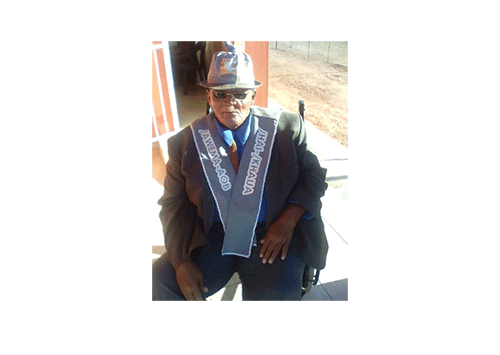Salmaan Dhameer Jacobs
Another struggle hero, comrade Ernst Petrus Jakobs, from Berseba, //Kharas region, has quietly passed on, in the early morning hours of 24 October 2022 at the age of 84. The news reached us with sadness and emptiness, as he remained a pillar of wisdom and comfort to most residents of Berseba and surrounding areas. The emptiness is felt because many relied on his wisdom and practical approach to solve their day-to-day problems within the traditional //Hai-Khaua community where he was the senior traditional councillor.
The rapid demise of struggle stalwarts departing this world for everlasting life, leaving unfinished business of economic emancipation to the younger generation, departing with their wealth of wisdom and foresight, creates emptiness in us and we wonder, which way now?
The question is not so much of not knowing the way, but it is more about the losing of wise leadership and guidance which we so much relied on over the years, especially during the dark days of apartheid struggles.
During the post-independence period, the elderly and younger generation of the Berseba constituency residents looked up to him for guidance, to steer them through the uncertain and thorny terrain of independence and its aftermath.
Our elder brother, Apietieb Ernst Jakobs and oupa to many younger generations, has been a steadfast and unwavering figure within a community that stood up against the onslaught of apartheid, especially during the protracted years from 1938 onwards when the traditional community was divided into two, the Goliaths and the Isaaks. This was the period when the last Kaptein Diedrick Goliath was banished by the apartheid South African rulers of the time to Hoachanas. The traditional community of Berseba thereafter became more divided, especially from 1970 onwards, when politics divided them more as either supporters of apartheid regime or those that stood up and fought for independence of the country. Late Ernst Petrus Jakobs was amongst those that stood up against apartheid presence in Berseba in particular, and Namibia in general.
What was peculiar about Apietieb Ernst Jakobs was that he was disabled having lost the use of both his legs in an unfortunate incident in the 60s, when a 200-litre drum water fell on him from a donkey cart and severely and painfully fractured both his legs. That was a painful period for his family, when he had to spend more than nine months in the Keetmanshoop hospital.
This did not deter him from standing up and be counted amongst the able-bodied foot-soldiers. At the height of the politics in Namibia in the early 70s, we, the brothers developed a comradeship of sharing information of what we heard over the Swapo radio or from political rallies held in Windhoek. We were very much impressed by his resourcefulness.
Always on top of the local news in Berseba and providing details of how developing stories on the political front unfolded itself in the village, it remained a mystery until today of how he obtained that information, since he, because of his disability, had to remain at home, most of the time.
When Chief Stephanus Goliath opened a Private Cambridge System School in Berseba around 1988, following on other similar schools in Gibeon in 1978, Hoachanas and Vaalgras, it was a day of repression from apartheid military forces, who did not want the opening of the school. Elderly and disabled people, including Apietieb Ernst Jakobs and my late father, Ou Raad Cornelius Jacobs, were teargassed, but they stood the test of that day as well, until freedom dawned on this country, few years down the line.
When freedom was achieved, he was once again amongst those who worked tirelessly to engage the community for unity talks. He was able to reach out to others, because of inter-marriages, and as a team, they achieved the near impossible of bringing the community together, around 2011. After the unity of the community, the traditional leader, Chief Johannes Isaack remarked, “we are celebrating unity, because we know the cost of disunity.”
The government of the day recognised his unwavering struggle and bestowed upon him the veteran status. His family will forever be grateful to the government and the people of Namibia to have recognised his admirable and brave stance.
He served his people with passion, indiscriminately, and rallied the community around him, solving their problems, especially traditional disputes, and many testified, of his ability to solve their problems. He will be missed by his immediate family. We, the brothers and sisters, the broad family and community of Berseba, the broader community and Namibia at large, will miss him dearly. He was a historian, adviser, unifier, peacemaker and friend to both young and old. A tree that provided shade in Berseba and the //Kharas region has fallen.
Those who remain should emulate his example of fighting for unity, for progress of the communities, and wanting to see results, and not to leave unfinished business. May his bereaved family be consoled that he lived a full life, where he showered all his love on them. They have many anecdotes to reminisce and to laugh fondly in anticipation of meeting him one day, in the ever-lasting life. He will be laid to rest in Berseba this Sunday.
May his soul rest in eternal peace.



